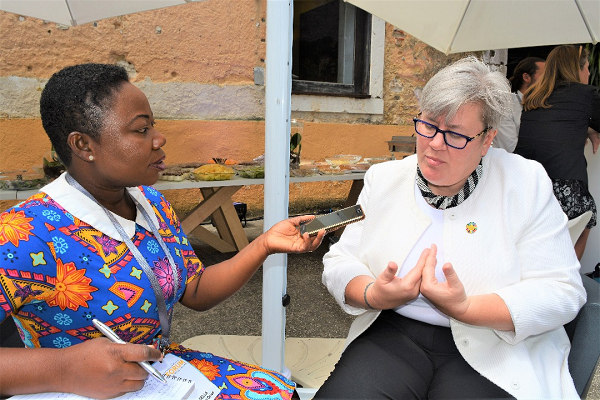
Use offshore resources to develop LPG — Kyte
Ghana has been urged to use its extraordinary offshore resources to effectively develop and maintain affordable liquefied petroleum gas (LPG) to help reduce energy poverty in the country.
According to the United Nations secretary General’s Special Representative and Chief Executive Officer (CEO) of the Sustainable Energy for ALL (SEforALL), Ms Rachel Kyte, finding an effective way to build the infrastructure and maintain an affordable LPG market was an important part of the solution in making energy accessible for all.
“Stakeholders must ensure there is widespread education on what the risks are and make sure safety issues are addressed, and ensure that new business models around consumer and distribution finance are properly looked at,” Ms Kyte said.
Speaking to the Graphic Business in an interview at the just-ended Sustainable Energy for ALL (SEforALL) Forum in Lisbon, Portugal, Ms Kyte indicated that Ghana was one of the countries that had put political priority on energy access goal, but the growth progress, she intimated, was still slow.
“Ghana is improving faster than the global average and the government needs to be congratulated for that; however, progress is still far too slow for most women and the rest of the population who still do not have access to electricity,” Ms Kyte pointed out.
Improved biomass
Ms Kyte, thus, called for the need for the Ghanaian government to speed up efforts on the development of improved biomass technology that would ensure the availability of different fuel sources for consumers which women, especially, could afford.
“Improved biomass can improve health and time savings for households, preserve forests and associated ecosystem services and reduce emissions that contribute to global climate change,” Ms Kyte said.
She also hinted that pellets, ethanol and other alternative forms of energy could also be explored so people could have choices to select from.
“Every Ghanaian woman must have the choice that the woman in Europe will have and government’s job is to support a market for fuels that are affordable, safe and clean,” she added.
Clean Cooking
On clean cooking, Ms Kyte stressed that there is no increase in the population that can access clean energy for cooking, particularly in sub-Saharan Africa.
“I want to stop that trend and turn it around, so we wouldn’t have to come to another forum and have the same story and numbers being repeated,” she reiterated, adding that: “If we can have countries such as Kenya, Ghana and Bangladesh going faster than they are presently, and other countries replicating the successes, that will be important for the growth we want to see:”, she stated.
Energy poverty, she said, would hold Africa back but “the pathway forward does not have to be Africa repeating the history of Europe or North America the opportunity is for Africa to leapfrog and build its own future with off-grid electricity alongside smart grid connected electricity, clean fuel for cooking among others”, she opined
Investments
Ms Kyte maintained the view that whereas many thought that energy access financing was capital intensive, it was not expensive as people thought, rather, it needed long-term investments and political leadership.
She emphasised that some African countries were going super faster and every other African country ought to understand what they were doing and further replicate the success stories of others.
Ms Kyte also suggested that of the $1.3 billion global energy access fund announced by the World Bank at the forum, majority of the new allocation should go to Africa since that was where the majority of those who did not have access to electricity and clean energy were.
“The number of people without access in the world is going down, but the proportion of that number that are Africans are going up, since the region is not moving as fast as other regions,” she stressed.
African governments, she noted, ought to put their vision in the right place and work with both development financial institutions and project financial institutions to ensure that prices were affordable, efficient, reliable and clean.
Writer’s email.